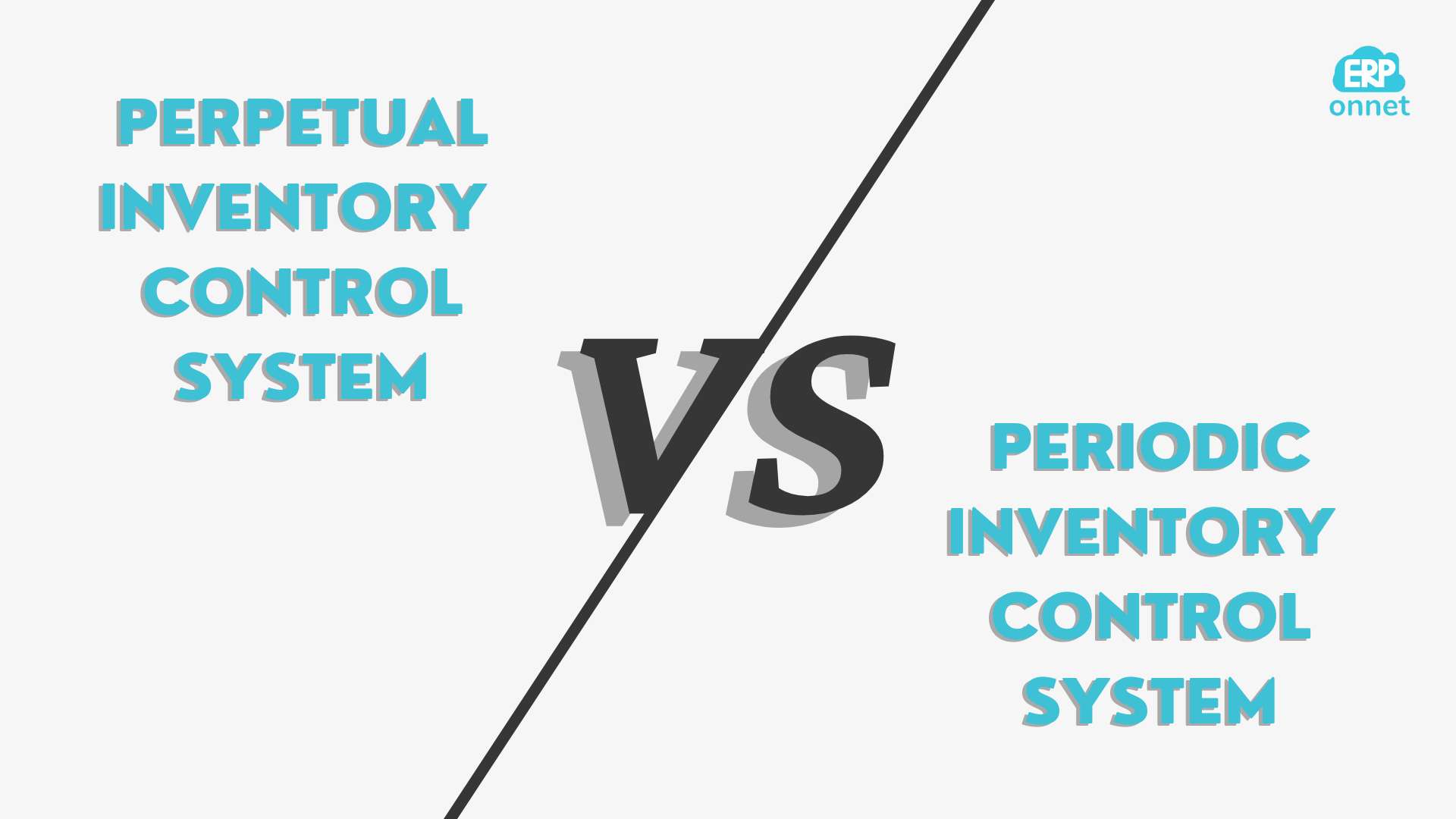Key Takeaway of This Blog
What is Inventory Control System?
Inventory control systems are one business management solution that takes care of a lot of the manual work usually needed to keep track of inventory in business.
It keeps an eye on your inventory from when they arrive to when they leave the warehousing, ensuring operations run seamlessly from start to finish.
Purchasing, receiving, warehousing, delivering, and returning are all integrated into a single business management system.
So you are able to keep a close watch on what you have, where they are kept, when, and what you should order next.
This way, you always have just the right amount of stock to make sure your customers are happy.
 Types of Inventory Control Systems
Types of Inventory Control Systems
Periodic Inventory Control Systems
Perpetual Inventory Control Systems
Periodic Inventory Control System VS Perpetual Inventory Control System
Periodic Inventory Control System
- Periodic intervals for stock updates
- Manual inventory control
- Suitable for small size companies with small inventories
- Less accurate & time-consuming
- No expensive software/hardware needed
- Calculate COGS at the end of accounting period
Perpetual Inventory Control System
- Real-time inventory updates
- Automated inventory control
- Suitable for medium-large companies with large inventories
- Accurate & time-saving
- Costly software/hardware is needed
- Automatically show COGS in real-time
Want to know how? Tell us.
Periodic Inventory Control Systems
Periodic inventory control system updates your inventory data at regular intervals (monthly/quarterly) where manual counting of your inventory is required.
When To Use Period Inventory Control Systems?
Companies typically use a periodic inventory system when they sell a small amount of goods or if they don’t have enough staff to do a continuous inventory count. It is commonly used by small businesses, art dealers, and car dealerships, for example.
Advantages of Periodic Inventory Control Systems
The nice thing about the periodic inventory system is that it is easy to set up and does not require any fancy software. It is a cost-effective way to keep track of inventory if you do not have a lot of products.
Disadvantages of Periodic Inventory Control Systems
Since it relies on manual data entry, there is a higher chance of making mistakes or having inaccurate counts.
Plus, periodic inventory control systems do not give you detailed information about each item or transaction, making it difficult to catch accounting errors in real time and accurately track how your products are moving.
Hence, calculating the cost of goods sold (COGS) becomes more challenging with periodic inventory control systems.
So, while the periodic inventory control system has its benefits for certain businesses, it does come with its limitations and potential drawbacks.
Perpetual Inventory Control System
Perpetual inventory control system uses technology for real-time inventory tracking. When a product's barcode is scanned, the inventory control system is instantly updated to reflect additions or subtractions as products are received or sold.
When to Use Perpetual Inventory Control Systems?
Perpetual inventory control system is ideal for companies with multiple locations and large inventories, including a variety of products, which helps you know the exact number of units in stock in real time.
Perpetual inventory control system also works well for fast-growing companies that want to manage their working capital closely.
If a business is focused on fulfilling customer orders quickly, having detailed information about inventory balances is vital, which is exactly what the perpetual inventory control system offers.
Advantages of Perpetual Inventory Control Systems
With a perpetual inventory control system, you don't have to manually count your inventory anymore. Instead, you are given a real-time snapshot of your inventory levels over a specific period.
Real-time inventory data helps you make smarter decisions regarding sales, ordering, and managing inventory.
Perpetual inventory control systems also come in handy for keeping a close eye on problems like theft, loss, or breakage. By knowing exactly which products are available, your team can also fulfill customers’ orders better.
Disadvantages of Perpetual Inventory Control Systems
Implementing perpetual inventory control systems can be a bit costly for businesses, particularly those with multiple locations or warehouses.
Because it requires specialized hardware and software. Regular maintenance and upgrades will also add to the expenses.
So, while perpetual inventory control systems offer real-time tracking and accurate inventory information, they do come with costs and the need for proper maintenance. It is important to weigh the benefits against the challenges when deciding whether to implement a perpetual inventory control system for your business.
Why Inventory Controls Software Are Important?
Inventory control software plays a vital role in the success of Malaysian businesses. Let's explore why inventory control systems are so important.
- Maintain accuracy
- Improve customer satisfaction
- Measure changes accurately
- Reduce write-offs
- Balance supply and demand
 Maintain accuracy
Maintain accuracy
Ensuring accuracy in inventory records is vital. But relying on manual stock counting can introduce errors and throw things off.
By using inventory control software, you can monitor stock levels in real time and get an accurate picture of what is in your warehouse and how it changes over time. So you will see how exactly stock moves to ensure you have the right amount of stock on hand.
 Improve customer satisfaction
Improve customer satisfaction
Speaking of customers, their satisfaction is a top priority. Without reliable control software, you risk running out of high-demand products, which can push customers to switch to your competitors and harm your company’s reputation.
By investing in reliable inventory control software, you can keep track of stock and receive timely alerts for reordering. This way, you can meet customer demands and keep them happy at all times.
 Measure changes accurately
Measure changes accurately
Sales patterns fluctuate throughout the year, and you need to adjust your high-demand stock levels accordingly for each season. By tracking these changes with the inventory control software, you can optimize your procurement activities, production, and deliveries.
This allows you to adjust your stock levels of high-demand items accordingly for each season, ensuring that you always have the most profitable products in stock.
 Reduce write-offs
Reduce write-offs
Inventory control software reduces write-offs. Without inventory control systems, you will encounter issues such as overstocking, lost items, or damaged items, resulting in wasted resources and decreased profits.
This is why we need inventory control software to minimize write-offs by ensuring you only carry the inventory you actually need, reducing waste, and maximizing efficiency.
 Balance supply and demand
Balance supply and demand
Overstocking ties up capital and warehouse space, while understocking risks not being able to fulfill orders.
Inventory control software helps you accurately forecast demand. So you can maintain the right amount of inventory, preventing overstocking or understocking.
Wrap Up
Inventory is a valuable asset of your business. So, it is a must to find efficient inventory control software to support your inventory control methods.
Want to know what inventory management techniques an inventory control software can support? Click here.
Quickly get the right inventory control software for your business, so you can maintain accurate inventory records, improve customer satisfaction, measure changes accurately, reduce write-offs, and balance supply and demand.
Operating a business in Malaysia? Hey, you are lucky! We are here to extend a helping hand. But we need to know more about your business model before we can assist!
So tell us now!